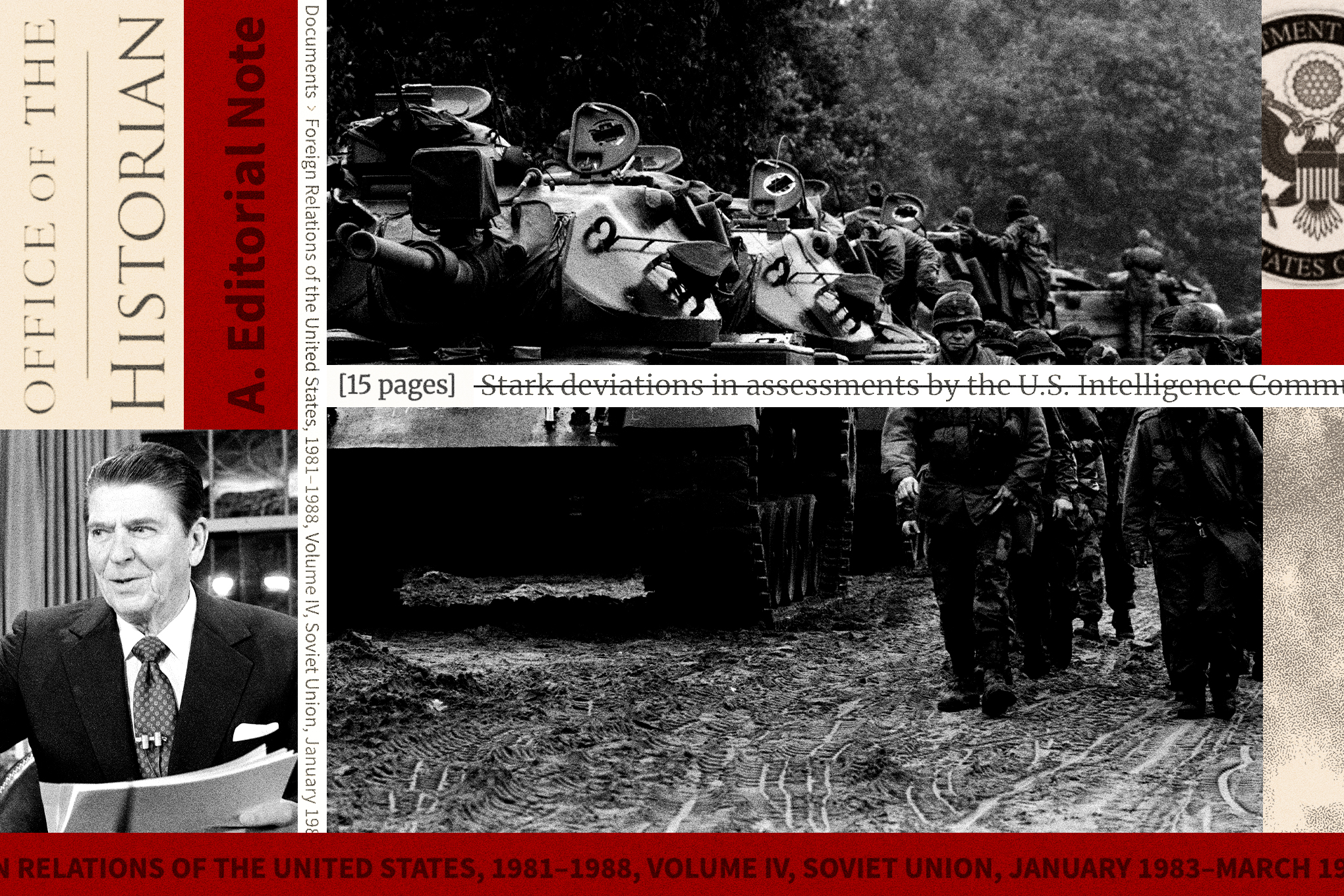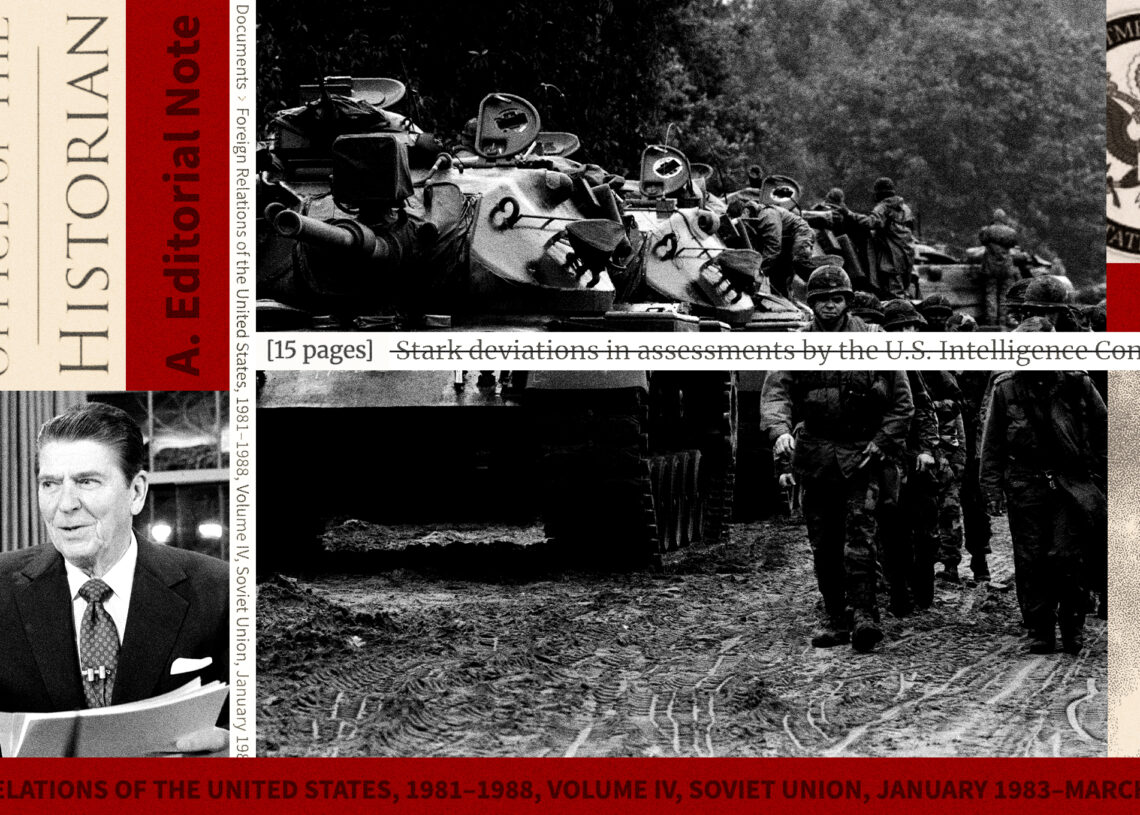
There’s a collection of official historical documents published by the U.S. government that — let’s be blunt — I’m obsessed with.
These documents recount President Ronald Reagan’s relations with the Soviet Union in the early 1980s, one of the most dangerous periods of the Cold War. Nuclear threats, high-stakes spy games and possible war: For a public records buff and a Tom Clancy aficionado, the once-secret files are pretty spectacular.
There’s a collection of official historical documents published by the U.S. government that — let’s be blunt — I’m obsessed with.
These documents recount President Ronald Reagan’s relations with the Soviet Union in the early 1980s, one of the most dangerous periods of the Cold War. Nuclear threats, high-stakes spy games and possible war: For a public records buff and a Tom Clancy aficionado, the once-secret files are pretty spectacular.
But earlier this year, when I clicked open the online volume I had read many times before, I noticed something was different. I blinked and blinked again, until I was finally satisfied that I was not hallucinating: Key historical records had been removed without explanation.
The State Department had deleted history.
Let me back up. Since 1991, the department has been required by law to publish “a thorough, accurate, and reliable” history of U.S. foreign policy within 30 years of the events. It does this in the Foreign Relations of the United States series, curated collections of primary source documents abbreviated as FRUS.
The State Department has published more than 450 volumes, which include thousands of primary source records detailing the crafting of U.S. foreign policy dating back to the Lincoln administration. The thick, bound ruby buckram volumes are a staple on the bookshelves of many college history departments where they remain an invaluable tool for students, scholars and authors.
But in the internet era, FRUS has become a predominantly digital publication, hosted on the State Department’s website.
And it is easier to delete digital records than to destroy books.
This January, the State Department did just that when it republished on its website a volume about the Reagan administration — without 15 pages on the risk of inadvertent nuclear war sparked by a 1983 NATO exercise.
Previously, the revelations about the incident, known as the Able Archer 83 War Scare, were included toward the end of the 14,079-page digital volume on the Reagan administration’s foreign policy toward the Soviet Union between January 1983 and March 1985.
These pages, originally published in February 2021, included historical documents such as a warning from the Defense Intelligence Agency director that Able Archer 83 brought the United States closer to nuclear war than most realized. The Washington Post reported these revelations at the time the collection of records was published.
According to the records, Able Archer 83 resembled an actual nuclear attack so closely that parts of the Soviet military made preparations for nuclear war. The documents revealed that the Soviet Union “implemented military and intelligence activities that previously were seen only during actual crises,” including placing fighter jets on alert “which included preparations for immediate use of nuclear weapons.”
According to another document excerpted in the Foreign Relations volume, after learning of the war scare, President Reagan “described the events as ‘really scary.’”
All that remains in that spot is a brief notation stating that 15 pages have been redacted, with no explanation as to why. A reference to the now deleted records in the new version’s introduction was changed — also without explanation — to refer readers to a less-detailed discussion of Able Archer 83 elsewhere in the volume.
A disclosure: Few, if any, people have studied Able Archer 83 as much as I have.
The first Freedom of Information Act requests I filed as an undergraduate in 2004 were about the incident. When they were denied, I was so chaffed that I spent more than a decade at the National Security Archive — a nonprofit research organization that fights for the release of important historical records — refining my FOIA skills.
Eventually, I won my FOIA battles and used the declassified records to write a book on Able Archer 83. I even did a podcast on it with Ed Helms.
So yeah, I took the deletion personally.
Imagine my surprise, then, when the State Department told me that I was the reason that the records were removed. I stared incredulously at my computer in July as I read an email from a spokesperson stating that the department deleted the records in response to my attempt to use FOIA to obtain an actual copy of a key record that was transcribed — but not reproduced — in the Foreign Relations volume.
In my attempt to get the record, I had sued the CIA, as the preface of the Foreign Relations volume thanked CIA staff for “arranging full access to CIA records.”
But D.C. federal judge James E. Boasberg ruled that the CIA did not have to release a copy of the original.
After reviewing classified declarations, Boasberg said the CIA was not obliged because the agency “was not properly involved in the document’s disclosure.” The U.S. Court of Appeals for the D.C. Circuit upheld the ruling.
And then the 15 pages on a near-nuclear war went missing from the State Department volume.
A former State Department official told The Post that the removal of documents from a FRUS volume was not wise, noting it could lead to the “Streisand effect” — a phenomenon in which attempts to scrub information from the internet usually make that information more well known.
“Once it’s out there, pulling it back causes more harm than good,” said the official, who had knowledge of the decision to remove the material but was not authorized to speak about it on the record. “But that’s not always the view of our friends at other agencies.”
According to a State Department spokesperson, the department had not explained the deletion of the section to the public because “the Department was not required to provide public notice.”
I began to wonder if other State Department histories had been altered.
I enlisted Andrew Ba Tran, a data reporter at The Post. He used the statistical programming language R to scrape and compare every Foreign Relations volume available on the State Department’s website with an earlier version preserved on the Wayback Machine website. He found no other such deletions.
The State Department spokesperson confirmed our work: “To my knowledge, there are no other instances where this has occurred.”
There is a watchdog committee of sorts, composed of historians who do not work for the government, that is empowered to oversee the publication of State’s histories.
The Office of the Historian, which publishes the Foreign Relations volumes, is required by law to allow the nine-member Historical Advisory Committee to “review records, and … advise and make recommendations to the Historian concerning all aspects of preparation and publication of the FRUS series.”
This Historical Advisory Committee has existed in some form since 1957, but Congress established the committee on a statutory basis and gave it increased authority in 1991. That’s when the State Department determined that volumes discussing foreign relations with Iran, Guatemala and other countries omitted so many CIA actions that they no longer faithfully depicted what had happened and “jeopardized the integrity and purpose of the series.”
I wondered: What did the Historical Advisory Committee know about the deletion of the Able Archer records?
My review of the board’s meeting notes between 2022 and 2025 found no references to the removal or alteration of this volume. Minutes from the March 2021 meeting did note, however, that the volume received “significant media coverage … because of its inclusion of newly released documents, including documents about the Able Archer exercise,” with a link to The Post’s article I co-wrote.
Richard Immerman, a Temple University professor, historian and author who served as the committee’s chairman from 2010 to 2021 — before the volume was withdrawn — called the unexplained removal of records from a FRUS volume “unprecedented.” He warned that the quiet alteration of histories would “call into question the integrity of the volumes.”
“I don’t know how that type of anomaly in which something was published and then withdrawn and then republished with something absent … cannot raise questions about whether it is thorough, reliable and accurate,” Immerman said.
The republication of the Soviet history volume with the missing pages occurred in the final days of Joe Biden’s presidency. In April, under the Trump administration, the nine nonpartisan Historical Advisory Committee members were fired.
This kind of turnover isn’t typical. I reviewed the committee’s minutes dating back to 1996, and found that the members of the committee remained largely consistent even as the party in charge changed.
No explanation was offered in an email obtained by The Post that was sent by Cate Dillon, the White House liaison to the State Department, to each member: “On behalf of President Donald J. Trump, I am writing to inform you that your position on the Advisory Committee on Historical Diplomatic Documentation is terminated effective immediately. Thank you for your service.”
Under the 1991 law, six of the nine committee members are appointed by the secretary of state from designated scholarly institutions. The other three are “at large” members, meaning they cannot be government employees.
On June 23, the State Department sent letters to the six historical organizations charged by statute with nominating members to the committee, asking them to each identity at least five candidates. One letter, obtained by The Post, described a committee seat as “a unique opportunity to support President Trump’s commitment to improving the Department of State’s return on investment for the American people” and a means to “deliver tangible results that put America First.”
James Goldgeier, an American University international relations professor who served as the committee’s chairman until his April termination, told me that he believed the dismissal of the entire committee was part of a wider effort to ensure that federal advisory boards were composed of appointees chosen by the Trump administration.
“Most of the work currently being done is on getting volumes out from the Reagan era and George H.W. Bush era,” Goldgeier said. “I really don’t think there is very much room for partisan angles for the type of work that this involves.”
When asked why all nine members of the committee were terminated, a spokesperson for the White House declined to comment and referred me back to the State Department.
In an emailed statement, a State Department spokesperson said the department is “actively vetting candidates” and that once the Historical Advisory Committee is reconstituted it will “continue to follow its responsibilities as stated in the statute.”
Because of the dismissals, the committee canceled its planned June, September and December meetings. It also failed to submit its annual report to Congress by the March 1 deadline as required by law.
As a result, Congress was not informed of the censored volume or of other issues with the Foreign Relations series, including the inability to meet the requirement that volumes must be published “not more than 30 years after the events recorded.”
It will probably be a while until the Historical Advisory Committee is staffed. Members are required by law to hold a security clearance, which generally takes a year or longer to acquire.
According to Immerman, the decimation of the committee undercuts the “heroic action” of State Department historians and increases the likelihood of future censorship of Foreign Relations volumes.
The goal, he said, “was to get these documents out to the public, where otherwise they would not have been.”
Other historians agree that the Foreign Relations volumes are an irreplaceable tool for understanding the country’s past and present. Sergey Radchenko, a professor at Johns Hopkins School of Advanced International Studies, cited the volumes 158 times in “To Run The World,” his history on U.S., Soviet and Chinese relations.
“If we can’t figure out how policy was made decades ago and what mistakes were made then,” he told me in an email, “how are we supposed to know how to conduct policy today?”
In the meantime, I’m happy to point historians and others interested toward the deleted Able Archer 83 records. Although they’re no longer available through the State Department, anyone with an internet connection can access them at the National Security Archive or the Wayback Machine.
Andrew Ba Tran and Monika Mathur contributed to this report.
Do you have a question, comment or FOIA idea? Leave a comment or email me at [email protected].
The post State Department deleted records about risk of inadvertent nuclear war
appeared first on Washington Post.




